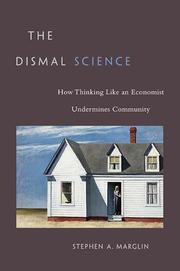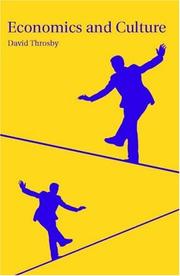| Listing 1 - 9 of 9 |
Sort by
|

ISBN: 9780674026544 0674026543 Year: 2008 Publisher: Cambridge, Mass. Harvard University Press
Abstract | Keywords | Export | Availability | Bookmark
 Loading...
Loading...Choose an application
- Reference Manager
- EndNote
- RefWorks (Direct export to RefWorks)
Economics --- Markets --- Economic development --- Communities. --- Social structure --- Economie politique --- Marchés --- Développement économique --- Communauté --- Structure sociale --- Sociological aspects. --- Social aspects. --- Economic aspects. --- Aspect sociologique --- Aspect social --- Aspect économique --- AA / International- internationaal --- 330.1 --- 174 --- #SBIB:33H000 --- 316.4 --- -Markets --- -Economic development --- -Communities --- -306.3 --- Organization, Social --- Social organization --- Anthropology --- Sociology --- Social institutions --- Community --- Social groups --- Development, Economic --- Economic growth --- Growth, Economic --- Economic policy --- Statics and dynamics (Social sciences) --- Development economics --- Resource curse --- Public markets --- Commerce --- Fairs --- Market towns --- Economic theory --- Political economy --- Social sciences --- Economic man --- Domein en natuur van de staathuishoudkunde. --- Verband tussen de ethiek en de economie. Ethiek en bedrijf. --- Economie: algemene werken --- Sociale processen --- Sociological aspects --- Social aspects --- Economic aspects --- 316.4 Sociale processen --- Marchés --- Développement économique --- Communauté --- Aspect économique --- Communities --- 306.3 --- Society and markets --- Economic sociology --- Socio-economics --- Socioeconomics --- Sociology of economics --- Verband tussen de ethiek en de economie. Ethiek en bedrijf --- Domein en natuur van de staathuishoudkunde
Book
ISBN: 0471201405 9780471201403 Year: 1972 Publisher: London: Wiley,
Abstract | Keywords | Export | Availability | Bookmark
 Loading...
Loading...Choose an application
- Reference Manager
- EndNote
- RefWorks (Direct export to RefWorks)
Probability theory --- Mathematical statistics --- Probabilities --- Statistique mathématique --- Probabilités --- AA / International- internationaal --- 306.3 --- 303.3 --- 10.01.a --- 10.02.b --- Probability --- Statistical inference --- Combinations --- Mathematics --- Chance --- Least squares --- Risk --- Statistics, Mathematical --- Statistics --- Sampling (Statistics) --- Vergissing, waarschijnlijkheid (toegepaste statistiek). --- Waarschijnlijkheid. Probabiliteit. Nauwkeurigheid. Residuals: measurement and specification (wiskundige statistiek). --- Verzekeringswiskunde ; Waarschijnlijkheidsrekening --- Statistieken ; Wiskundige statistiek --- Statistical methods --- Mathematical statistics. --- Probabilities. --- Statistique mathématique --- Probabilités --- Waarschijnlijkheid. Probabiliteit. Nauwkeurigheid. Residuals: measurement and specification (wiskundige statistiek) --- Vergissing, waarschijnlijkheid (toegepaste statistiek) --- Probabilités. --- Probabilités.
Book
ISBN: 9780521193009 9780511761539 9781107684614 9780511933066 0511933061 0521193001 0511761538 1107214130 0511852894 1282943731 9786612943737 0511931719 0511930372 051192786X 0511925328 1107684617 Year: 2011 Publisher: Cambridge, UK New York Cambridge University Press
Abstract | Keywords | Export | Availability | Bookmark
 Loading...
Loading...Choose an application
- Reference Manager
- EndNote
- RefWorks (Direct export to RefWorks)
Many economists now accept that informal institutions and culture play a crucial role in economic outcomes. Driven by the work of economists like Nobel laureates Douglass North and Gary Becker, there is an important body of work that invokes cultural and institutional factors to build a more comprehensive and realistic theory of economic behavior. This book provides a comprehensive overview of research in this area, sketching the main premises and challenges faced by the field. The first part introduces and explains the various theoretical approaches to studying culture in economics, going back to Smith and Weber, and addresses the methodological issues that need to be considered when including culture in economics. The second part of the book then provides readers with a series of examples that show how the cultural approach can be used to explain economic phenomena in four different areas: entrepreneurship, trust, international business and comparative corporate governance.
BUSINESS & ECONOMICS / Economics / General --- Economics --- Culture --- Economie politique --- Sociological aspects --- Economic aspects --- Aspect sociologique --- Aspect économique --- -AA / International- internationaal --- -330.1 --- 201 --- 306.3 --- Cultural sociology --- Sociology of culture --- Civilization --- Economic theory --- Political economy --- Social sciences --- Economic man --- Domein en natuur van de staathuishoudkunde. --- Sociologie: algemeenheden. --- Social aspects --- Aspect économique --- 330.1 --- AA / International- internationaal --- Economic sociology --- Socio-economics --- Socioeconomics --- Sociology of economics --- Sociology --- Sociologie: algemeenheden --- Domein en natuur van de staathuishoudkunde --- Sociological aspects. --- Economic aspects. --- Business, Economy and Management
Book
ISBN: 9781405183697 1405183691 Year: 2011 Publisher: Chichester Wiley-Blackwell
Abstract | Keywords | Export | Availability | Bookmark
 Loading...
Loading...Choose an application
- Reference Manager
- EndNote
- RefWorks (Direct export to RefWorks)
International financial management --- Financial risk management. --- Probabilities. --- Finances --- Probabilités --- Gestion du risque --- AA / International- internationaal --- 305.91 --- 305.975 --- 306.3 --- 305.6 --- 333.109 --- Financial risk management --- Probabilities --- 332.015192 --- Probability --- Statistical inference --- Combinations --- Mathematics --- Chance --- Least squares --- Mathematical statistics --- Risk --- Risk management --- Econometrie van de financiële activa. Portfolio allocation en management. CAPM. Bubbles. --- Monte Carlo methods. Experimenten en resultaten. --- Vergissing, waarschijnlijkheid (toegepaste statistiek). --- Risicotheorie, speltheorie. Risicokapitaal. Beslissingsmodellen. --- Veiligheid. Bankovervallen. Bankrisico's. --- Probabilités --- Risicotheorie, speltheorie. Risicokapitaal. Beslissingsmodellen --- Econometrie van de financiële activa. Portfolio allocation en management. CAPM. Bubbles --- Monte Carlo methods. Experimenten en resultaten --- Vergissing, waarschijnlijkheid (toegepaste statistiek) --- Veiligheid. Bankovervallen. Bankrisico's

ISBN: 1843763621 1845425804 Year: 2005 Publisher: Aldershot : Elgar,
Abstract | Keywords | Export | Availability | Bookmark
 Loading...
Loading...Choose an application
- Reference Manager
- EndNote
- RefWorks (Direct export to RefWorks)
Economics --- AA / International- internationaal --- 174 --- -Economics --- -Human behavior --- -Social problems --- -Social choice --- -306.3 --- Choice, Social --- Collective choice --- Public choice --- Choice (Psychology) --- Social psychology --- Welfare economics --- Reform, Social --- Social reform --- Social welfare --- Social history --- Applied sociology --- Action, Human --- Behavior, Human --- Ethology --- Human action --- Human beings --- Human biology --- Physical anthropology --- Psychology --- Social sciences --- Psychology, Comparative --- Economic theory --- Political economy --- Economic man --- Verband tussen de ethiek en de economie. Ethiek en bedrijf. --- Psychological aspects --- Sociological aspects --- Economic aspects --- Behavior --- Verband tussen de ethiek en de economie. Ethiek en bedrijf --- -Psychological aspects
Book
ISBN: 9780817649876 9780817649869 Year: 2010 Publisher: Boston MA Birkhäuser Boston Imprint Birkhäuser
Abstract | Keywords | Export | Availability | Bookmark
 Loading...
Loading...Choose an application
- Reference Manager
- EndNote
- RefWorks (Direct export to RefWorks)
With an emphasis on models and techniques, this textbook introduces many of the fundamental concepts of stochastic modeling that are now a vital component of almost every scientific investigation. These models form the basis of well-known parametric lifetime distributions such as exponential, Weibull, and gamma distributions, as well as change-point and mixture models. The authors also consider more general notions of non-parametric lifetime distribution classes. In particular, emphasis is placed on laying the foundation for solving problems in reliability, insurance, finance, and credit risk. Exercises and solutions to selected problems accompany each chapter in order to allow students to explore these foundations. The key subjects covered include: * Exponential distributions and the Poisson process * Parametric lifetime distributions * Non-parametric lifetime distribution classes * Multivariate exponential extensions * Association and dependence * Renewal theory * Problems in reliability, insurance, finance, and credit risk This work differs from traditional probability textbooks in a number of ways. Since no measure theory knowledge is necessary to understand the material and coverage of the central limit theorem and normal theory related topics has been omitted, the work may be used as a single-semester senior undergraduate or first-year graduate textbook as well as in a second course on probability modeling. Many of the chapters that examine central topics in applied probability can be read independently, allowing both instructors and readers extra flexibility in their use of the book. Probability and Statistical Models is for a wide audience including advanced undergraduate and beginning-level graduate students, researchers, and practitioners in mathematics, statistics, engineering, and economics.
Mathematics. --- Probability Theory and Stochastic Processes. --- Statistics for Business/Economics/Mathematical Finance/Insurance. --- Appl.Mathematics/Computational Methods of Engineering. --- Mathematical Modeling and Industrial Mathematics. --- Statistics for Engineering, Physics, Computer Science, Chemistry and Earth Sciences. --- Quantitative Finance. --- Finance. --- Distribution (Probability theory). --- Economics --- Engineering mathematics. --- Mathématiques --- Finances --- Distribution (Théorie des probabilités) --- Mathématiques de l'ingénieur --- Statistics. --- Distribution (Probability theory) --- Mathematical statistics --- Stochastic processes --- AA / International- internationaal --- 303.3 --- 306.3 --- 305.0 --- 519.24 --- Random processes --- Probabilities --- Mathematics --- Statistical inference --- Statistics, Mathematical --- Statistics --- Sampling (Statistics) --- Distribution functions --- Frequency distribution --- Characteristic functions --- Waarschijnlijkheid. Probabiliteit. Nauwkeurigheid. Residuals: measurement and specification (wiskundige statistiek). --- Vergissing, waarschijnlijkheid (toegepaste statistiek). --- Toegepaste econometrie en statistiek (algemene naslagwerken). Statistische onderzoekingen en studiën. --- Statistical methods --- Waarschijnlijkheid. Probabiliteit. Nauwkeurigheid. Residuals: measurement and specification (wiskundige statistiek) --- Toegepaste econometrie en statistiek (algemene naslagwerken). Statistische onderzoekingen en studiën --- Vergissing, waarschijnlijkheid (toegepaste statistiek)

ISBN: 0521586399 052158406X 9780521586399 0511013876 1107590108 1139901893 0511054084 113991751X 0511155980 9780521584067 9781107590106 1139903845 0511038844 9780511013874 9780511155987 9780511054082 9781139903844 9780511038846 9781139901895 Year: 2001 Publisher: Cambridge, UK New York Cambridge University Press
Abstract | Keywords | Export | Availability | Bookmark
 Loading...
Loading...Choose an application
- Reference Manager
- EndNote
- RefWorks (Direct export to RefWorks)
In an increasingly globalised world, economic and cultural imperatives can be seen as two of the most powerful forces shaping human behaviour. This book considers the relationship between economics and culture both as areas of intellectual discourse, and as systems of societal organisation. Adopting a broad definition of culture, it explores the economic dimensions of culture, and the cultural context of economics. The book is built on a foundation of value theory, developing the twin notions of economic and cultural value as underlying principles for integrating the two fields. Ideas of cultural capital and sustainability are discussed, especially as means of analysing the particular problems of cultural heritage, drawing parallels with the treatment of natural capital in ecological economics. The book goes on to discuss the economics of creativity in the production of cultural goods and services; culture in economic development; the cultural industries; and cultural policy.
330.123.6 --- -#A0201A --- 600 Cultuur --- 339.44 --- 339.10 --- Collectieve goederen. Dienstverlening --- Kunstmarkt. --- Raming van het goederenbezit en van het inkomen: algemeenheden. --- 330.123.6 Collectieve goederen. Dienstverlening --- Culture - Economic aspects. --- Economics --- Culture --- Economic sociology --- Socio-economics --- Socioeconomics --- Sociology of economics --- Sociology --- Sociological aspects. --- Economic aspects. --- Social aspects --- 306.3 --- AA / International- internationaal --- 330.1 --- 7 --- 460 Economie --- #A0201A --- 330.1 Economische grondbegrippen. Algemene begrippen in de economie --- Economische grondbegrippen. Algemene begrippen in de economie --- 7 Kunst. Ruimtelijke ordening. Architectuur. Sport en spel --- Kunst. Ruimtelijke ordening. Architectuur. Sport en spel --- Economic aspects --- Sociological aspects --- Raming van het goederenbezit en van het inkomen: algemeenheden --- Kunstmarkt --- Business management --- Economic policy and planning (general) --- Sociology of culture --- Cultural policy. --- Economie politique --- Aspect sociologique --- Aspect économique --- Economie --- Politique culturelle --- Aspect économique --- Aspect social
Book
ISBN: 9780691146485 0691146489 0691152551 9781400834181 9786612531477 1282531476 140083418X 9780691152554 9781282531475 Year: 2010 Publisher: Princeton : Princeton University Press,
Abstract | Keywords | Export | Availability | Bookmark
 Loading...
Loading...Choose an application
- Reference Manager
- EndNote
- RefWorks (Direct export to RefWorks)
Identity Economics provides an important and compelling new way to understand human behavior, revealing how our identities--and not just economic incentives--influence our decisions. In 1995, economist Rachel Kranton wrote future Nobel Prize-winner George Akerlof a letter insisting that his most recent paper was wrong. Identity, she argued, was the missing element that would help to explain why people--facing the same economic circumstances--would make different choices. This was the beginning of a fourteen-year collaboration--and of Identity Economics. The authors explain how our conception of who we are and who we want to be may shape our economic lives more than any other factor, affecting how hard we work, and how we learn, spend, and save. Identity economics is a new way to understand people's decisions--at work, at school, and at home. With it, we can better appreciate why incentives like stock options work or don't; why some schools succeed and others don't; why some cities and towns don't invest in their futures--and much, much more. Identity Economics bridges a critical gap in the social sciences. It brings identity and norms to economics. People's notions of what is proper, and what is forbidden, and for whom, are fundamental to how hard they work, and how they learn, spend, and save. Thus people's identity--their conception of who they are, and of who they choose to be--may be the most important factor affecting their economic lives. And the limits placed by society on people's identity can also be crucial determinants of their economic well-being.
Economic order --- Economics --- Identity (Philosophical concept) --- Psychological aspects --- Sociological aspects --- AA / International- internationaal --- 330.1 --- 330.56 --- 15 --- 202 --- 311.7 --- Economische grondbegrippen. Algemene begrippen in de economie --- Nationaal inkomen. Volksinkomen. Gezinsinkomen. Vermogensstratificatie. Particuliere inkomens en bestedingen. Armoede. Honger --- Psychologie. --- Sociale organisatie. --- Geestelijke toestand van de bevolking. --- Economics - Psychological aspects. --- Economics -- Psychological aspects. --- Economics - Sociological aspects. --- Economics -- Sociological aspects. --- Identity (Psychology). --- Business & Economics --- Economic Theory --- Identity (Psychology) --- Welvaartseconomie --- Welzijn --- Psychological aspects. --- Social aspects. --- Sociological aspects. --- -Identity (Psychology) --- -Economics --- -306.3 --- Economic theory --- Political economy --- Social sciences --- Economic man --- Personal identity --- Personality --- Self --- Ego (Psychology) --- Individuality --- -Electronic information resources --- Electronic information resources --- Social aspects --- E-books --- Welvaartseconomie. --- Welzijn. --- 330.1 Economische grondbegrippen. Algemene begrippen in de economie --- 330.56 Nationaal inkomen. Volksinkomen. Gezinsinkomen. Vermogensstratificatie. Particuliere inkomens en bestedingen. Armoede. Honger --- Economic sociology --- Socio-economics --- Socioeconomics --- Sociology of economics --- Behavioral economics --- Behavioural economics --- Sociology --- Psychologie --- Sociale organisatie --- Geestelijke toestand van de bevolking --- Social Sciences and Humanities. Economics -- Labour Economics --- ALLW. --- Economics - Psychological aspects --- Identity (Philosophical concept) - Periodicals --- Economics - Sociological aspects --- Social Sciences and Humanities. Economics -- Labour Economics.
Book
ISBN: 0387966897 3540966897 9780387966892 9783540966890 Year: 1989 Publisher: New York (N.Y.): Springer,
Abstract | Keywords | Export | Availability | Bookmark
 Loading...
Loading...Choose an application
- Reference Manager
- EndNote
- RefWorks (Direct export to RefWorks)
Numerical solutions of differential equations --- Computer science --- Chaotic behavior in systems --- Algorithms --- Nonlinear theories --- Chaos --- Algorithmes --- Théories non linéaires --- 519.6 --- 681.3 *G18 --- 681.3*G17 --- AA / International- internationaal --- 306.3 --- 303.3 --- Nonlinear problems --- Nonlinearity (Mathematics) --- Calculus --- Mathematical analysis --- Mathematical physics --- Chaos in systems --- Chaos theory --- Chaotic motion in systems --- Differentiable dynamical systems --- Dynamics --- System theory --- Algorism --- Algebra --- Arithmetic --- Computational mathematics. Numerical analysis. Computer programming --- Partial differential equations: difference methods; elliptic equations; finite element methods; hyperbolic equations; method of lines; parabolic equations (Numerical analysis) --- Ordinary differential equations: boundary value problems; convergence and stability; error analysis; initial value problems; multistep methods; single step methods; stiff equations (Numerical analysis) --- Vergissing, waarschijnlijkheid (toegepaste statistiek). --- Waarschijnlijkheid. Probabiliteit. Nauwkeurigheid. Residuals: measurement and specification (wiskundige statistiek). --- Foundations --- 681.3*G17 Ordinary differential equations: boundary value problems; convergence and stability; error analysis; initial value problems; multistep methods; single step methods; stiff equations (Numerical analysis) --- 681.3 *G18 Partial differential equations: difference methods; elliptic equations; finite element methods; hyperbolic equations; method of lines; parabolic equations (Numerical analysis) --- 519.6 Computational mathematics. Numerical analysis. Computer programming --- Théories non linéaires --- Waarschijnlijkheid. Probabiliteit. Nauwkeurigheid. Residuals: measurement and specification (wiskundige statistiek) --- Vergissing, waarschijnlijkheid (toegepaste statistiek)
| Listing 1 - 9 of 9 |
Sort by
|

 Search
Search Feedback
Feedback About UniCat
About UniCat  Help
Help News
News